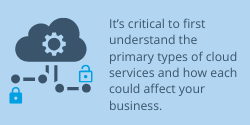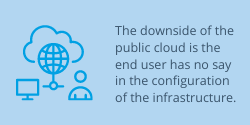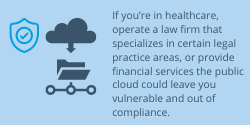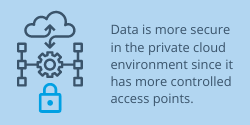
22 Jun Your Guide to Choosing the Right Cloud Option
The concept of the cloud certainly isn’t new, but that doesn’t make it any easier to figure out which option is right for your business.
Outsourcing your IT infrastructure to a third party definitely has its appeal. After all, you can reduce costs, enhance security, and improve efficiency by working with the right cloud services vendor.

It’s critical to first understand the primary types of cloud services and how each could affect your business. It’s also important to understand that the cloud sounds like an ethereal thing – but the truth is, the cloud is actually a physical location where your data will live until you recall it back to your network.
The Public Cloud
You may be familiar with the biggest players in public cloud, after all, most of them are household names. Amazon, Google, Microsoft, and even IBM offer public cloud solutions. Anyone can access and use these services to support their business activities and to host their data.
The public cloud providers offer scalability to keep pace with user demands. Users of public cloud services can reduce their need for internal IT departments and improve their resource allocation. Most public cloud options ensure reliability with uptime guarantees.
All of which probably sounds like exactly what your business needs. Except there are some significant disadvantages to the public cloud.

For some, there are also significant data privacy concerns.
“It happens all too frequently that a law practice will end up calling us after they’ve spent more than they expected or the migration to the public cloud was bumpier than they expected,” said Sherry Christian, CyberlinkASP cloud computing expert for small to midsize legal firms.
While the public cloud typically operates on a pay-as-you-go model, these providers expect users to self-manage. If you have the technical expertise to set up the system, your servers, and network, it can work out well. But if you prefer a managed solution, the public cloud could end up costing you more than bargained for in time, attention, and operational expenses.

If you’re a midsize to large business with privacy and compliance concerns, you may want to consider other cloud options
The Private Cloud
If you need more control over your resource allocation, a private cloud might be a better choice for your business. The private cloud offers the same scalability and reliability of the public cloud, but the user has more control over where and how the cloud resources are best utilized.
The private cloud is particularly beneficial to businesses with predictable data processing and storage requirements. The customization afforded by private cloud hosting services meets the requirements of regulated industries as well.

If an organization currently relies on legacy on-premise applications, a private cloud may be the only option. Since the public cloud can’t be customized by the tenant, oftentimes there is no way to get support for certain applications in the public cloud.
Without a seamless migration, the full benefit of cloud computing won’t be realized. A private cloud can be designed to meet all your computing needs. By hosting all your applications and data in a singularly focused cloud, total cost of ownership is reduced.
Finally, a private cloud offers unparalleled regulatory compliance options. Your cloud provider can partner with your organization to increase efficiency of your compliance elements whether you need to meet HIPAA or PCI compliance standards.
Need Help Deciding Which Cloud Environment is Right for You?
At CyberlinkASP, we can help you assess your computing needs so you can take advantage of the most cost-effective solutions for your business while meeting all the compliance and security requirements of your industry.
We have specially trained industry experts who will ask the right questions so we can build the right solution for you.
Ready to talk? Schedule a no obligation consultation call today.